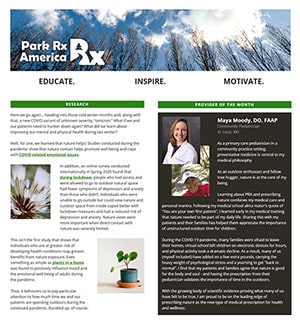Case for Nature Prescriptions
Nature prescriptions? You're probably thinking, "What a great idea, but who has time in a busy clinical practice to write nature prescriptions?" We all know that time is a bully, and we struggle with the 15-20 minute visit. Could it be that Nature Prescriptions is just one more great idea that no one has time to do?
Background
Before we answer this question, let us first disclose that we have been practicing primary care for over 20 years, and we have learned that listening to and counseling our patients is a very important aspect of our jobs. Many of our patients either suffer from or have risk factors for chronic disease. So we are already counseling during a short visit about many topics, such as eating healthier, being more aware of diabetogenic foods, decreasing use of electronic devices, spending more time with loved ones, exercising, and so on.
As healthcare professionals, we have a responsibility not only to diagnose, but to provide effective advice on ways to improve the health of our patients and clients. So the question is not whether we should counsel or not. It's more a matter of "how." When we talk about using a nature-based intervention, we move into the realm of the "how"-- how best to counsel patients.
Evidence
We know that there is a preponderance of evidence that incorporating more nature into our lives improves our physical and mental health and social well-being, AND that nature prescriptions increase our patient's likelihood of spending more time in nature. This compels us to make the case for incorporating nature prescriptions into our patient visits.
Having a short conversation about spending more time outdoors and writing that specific nature prescription, might, in fact be more effective in bringing about desired outcomes (like increased happiness or weight loss; decreased blood pressure, depressive symptoms or A-1 C; and increased focus and attention) for your patients than simply telling them to "exercise more" or "eat healthier."
Issuing a nature prescription is not "in addition to," but rather part and parcel of the work that we already do. If you are in a practice setting where counseling about behavior change is part of your patient visit, writing a nature prescription might be just what the "doctor" needs.

